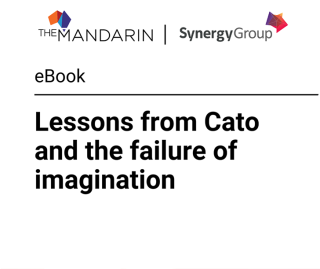
-
What We Do
-
How We Think
-
Our People
-
Our Offices
-
About Us
-
Get In Touch

Ah procurement! The term often strikes fear into the hearts of every (or at least most) public servant. Adding to these fears are perceptions of complex regulatory and policy frameworks as well as the certainty of an audit. As discussed in previous articles, procurement isn't done well, in general in the APS (or in State/Territory Governments for that matter)1. However, it doesn't have to be this way - and (most) public servants need not 'live in fear' of procurement. In fact, the opposite should be true - they should embrace procurement, banish the fears and develop a positive approach to procurement and contracting.
One simple way to change our approach and perceptions of procurement is to adopt a positive leadership model. Positive leadership emphasises positive, constructive and collaborative teams. It is based on positive psychology principles, researched extensively by Martin Siligman2. Another leading psychologist - and an unabashed 'disciple' of Seligman spoke about the power of positivity in the context of 'manifesting' or visualising positive outcomes in her podcast - No Stupid Questions3. The obvious 'flaw' in positive visualisations is that without a plan, the positive vibes sent out to the universe will almost inevitability fail.
How does that apply in the procurement context? Positive leadership can be applied to procurement and contracting through any number of methods. At Synergy Group, our team - and our practice is to combine these methods and create a "web" - connecting key elements of support, collaboration, trust, empathy and resilience. So, let's look at these and see how they can be applied to procurements, particularly more complex procurements.
Support: Procurements need to be supported with resources, time and collaboration. This is irrespective of the procurement model the agency uses, whether it is business area localised or central procurement support for example. Additionally, the support of external specialist advisors is absolutely essential to ensure success validity, particularly probity, legal, commercial, financial and technical, where the scale and complexity of the procurement justifies this and can support necessary 'independence' and assurance of process where required.
Leaders can provide support by guiding team members to navigate the regulatory and policy requirements as well as providing access to specialised resources. Leaders can further support their teams by ensuring an inclusive environment where diversity of thought is welcomed and celebrated. That includes building 'safe spaces' where differences of opinion can be openly discussed, without disrespect or exclusion, where juniors, minorities and voice-less-often-heard have a seat (and ears) at the table. It is, in particular, the ability of all team members to be listened to, and for their actions to be held accountable that will drive better outcomes. There are a number of reports, including from a range of recent Royal Commission that clearly demonstrate that silence is not golden - at least not in the context of good governance (the Baking Royal Commission being a great example)4.
Collaboration: Positive leadership encourages collaboration and teamwork. Leaders can assist this by facilitating an open exchange of ideas, where all team members feel comfortable sharing their insights, noting this might include some uncomfortable conversations. While this is a truism about leadership, it is especially to procurement and contracting as an open and collaborative environment allows all team members to raise their concerns or ideas in a safe environment. This promotes a culture of fraud and corruption control, or even "if you see something, say something".
Trust: Positive leaders build trust through transparency, honesty, and consistency. Trust is foundational to a healthy work environment and fosters strong relationships between leaders and team members. Trust is also the backbone of procurement and contracting activities. We need to be able to trust each other, trust that everyone is trying to achieve a positive outcome for the agency as well as Australians, who are (ultimately) our end-users and clients. It's in that type of environment that all team members will be able to demonstrate the integrity and probity required to ensure our procurements have the ability to withstand scrutiny. Furthermore, an environment of trust, in conjunction with the other positive leadership traits will create an environment where integrity, honesty and difference are facilitated and where team members can put "their head above the parapet" without fear of being "shot down".
Empathy: Understanding and empathising with needs, concerns, and perspectives of team members is a hallmark of positive leadership. Good leaders need to cultivate active listening skills and demonstrate genuine care for the well-being of their team. In procurement this means "pitching in" when the going gets tough (particularly when stakeholders complain) or when it 'just all seems too hard.' It can also mean allowing people to stand back when they need, even if just for a day or two, to breathe and recoup. It also means investing in training and ongoing professional development to ensure team members have the skills required. That will enable team members to develop their own leadership skills and be guided by empathy, thereby creating an environment where the team continually grows and transfers these needed skills to new and junior team members.
Resilience: Positive leaders exhibit resilience in the face of setbacks. They bounce back from challenges and encourage their teams to learn and grow from difficult experiences. Positive leaders are adaptable and open to change. They are open to being shown different ways of doing things and being shown where they've gone wrong. They embrace innovation, encourage creativity, and guide their teams through transitions with a positive forward-thinking mindset. In procurements, resilience can be tested by a suite of issues, including - but most definitely not limited to - challenging stakeholders, time pressures, complex probity matters, resourcing - and the list goes on-and-on. However, and ultimately, it is the leader's responsibility to demonstrate responsibility and lead their team through these challenges, appreciating the difficulty while remaining positive.
On a personal note, I feel that resilience is the quintessential ingredient that can make-or-break a team. Resilience can mean a lot of different things to a lot of different people. To me - it is relatively straightforward - things can, and will, go wrong and that's ok. We learn from our mistakes and our teams learn from their mistakes. For public servants, this can be daunting, but as long as we have a plan, stick to it, record any variations from those plans, escalate issues to delegates, legal and probity advisors, then - things will be ok. And there'll be nothing to fear.
Why? Because procurement doesn't need to be scary if you have a plan and positive leadership. Those factors can go a long way to embracing procurement activities.
So go on. Go forward optimistically and achieve value-for-money - not only for a given project, but for the broader Australian community.
If you have any questions on procurement, please reach out and contact: skeenan@synergygroup.net.au
[1] Only Sticks and No Carrots - Synergy Group | Dynamic Leaders in Solutions for Government
[1] Martin Seligman & Positive Psychology: Theory and Practice (pursuit-of-happiness.org)
https://freakonomics.com/podcast/can-you-really-manifest-success-through-positive-visualization/.
[1] Can You Really “Manifest” Success Through Positive Visualization? - Freakonomics
[1] Misconduct in the Banking, Superannuation and Financial Services Industry | Royal Commissions



